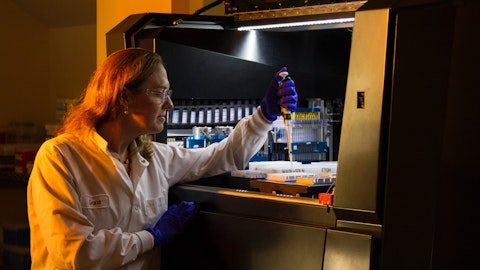Joshua Riggs: Yes. I can confirm for the DetermaIO that we did submit for both the non-small cell lung cancer and for triple-negative breast cancer. The EAP success has been really good for us. So, I won’t get into kind of like the specific sites and numbers, but reorder rate has been fantastic. And I think the biggest sign of success for us is when the researchers get access to the technology, and they were able to kind of use it to ask these questions. They get excited and then they want to set up IRBs and they want to set up studies. And that’s the momentum that we felt over the past three months is that there is a general level of excitement around DetermaIO’s ability to really assess the tumor micro environment. And then when we get to VitaGraft, it’s I think the use of absolute quantification is intuitive for docs who are used to seeing sort of absolute values on their test reports.
We don’t have the clinical data today to say that, that can supplant the way it’s being done with the fractional measurement, but it’s something that’s generated a lot of interest from the community. It’s testing incredibly well across the EAP and across our advisory boards.
Unidentified Analyst: Okay. Great. Yes, that’s very helpful. And then maybe one more, and I will hop back in the queue. Maybe I am understanding this wrong, but the RUO product, is this the €“ like the kitted version?
Joshua Riggs: That’s correct.
Unidentified Analyst: Okay. Perfect. Just wanted to make sure. Thank you very much.
Joshua Riggs: Thank you.
Operator: Thank you. Our next question comes from the line of Mason Carrico with Stephens Inc. Please proceed with your question.
Mason Carrico: Hi guys. Maybe just a couple of quick ones on the liver test. In terms of €“ once you get €“ you receive coverage there, how are you thinking about the initial revenue ramp? And how should we think about the build-out of maybe a more targeted or smaller commercial team once that coverage is established?
Joshua Riggs: Thank you for the question. We are very firmly pivoting towards a product approach as a company just because of the cost of building out a large sales and marketing team isn’t something that we can support at this time. And so I would expect that any sales and marketing effort around with liver and kidney in the transplant space is going to be very small, very targeted, focusing on deep relationships, more than sort of broad market adoption. And then we are going to rely on our distribution partners or our platform partners to help us really penetrate the market at the research level. So, I would say very low millions at maturity and that whenever we get coverage, reimbursement is about three months post that for revenue start.
Mason Carrico: Got it. And then maybe one more, how should we think about the pricing or economics of those product-based kits?
Joshua Riggs: It’s without getting into speculation, other tests, comparable tests have been reimbursed at $28.50 and $27.50-ish. We are hoping that we will be cross-walked to that pricing, but I can’t guarantee it.
Mason Carrico: Got it. Okay. Thanks guys.
Operator: Thank you. Our next question comes from the line of Bruce Jackson with The Benchmark Company. Please proceed with your question.
Bruce Jackson: Hi. Thanks for taking my question. So, with DetermaIO, you submitted for non-small cell lung cancer and triple-negative breast cancer. And then you mentioned that you have got the new data for colon that was just polished. Do you plan to add that to the application at some point?
Joshua Riggs: We are going to take that to our Science Committee. We haven’t made a determination on that. I think it’s just a matter of resources at this point. But we believe our best data right now is in non-small cell and triple negative.


